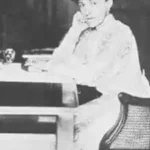 | |
The Pot-Boiler | |
| Author | Edith Wharton |
|---|---|
| Published |
1895
|
| Language | English |
| Nationality | American |
| Genre | Realism, Social Commentary |
1895 Short Story
The Pot-Boiler
The Pot-Boiler is an English Realism, Social Commentary short story by American writer Edith Wharton. It was first published in 1895.
The Pot-Boiler
by Edith Wharton
I
The studio faced north, looking out over a dismal reach of roofs and chimneys, and rusty fire-escapes hung with heterogeneous garments. A crust of dirty snow covered the level surfaces, and a December sky with more snow in it lowered over them.
The room was bare and gaunt, with blotched walls and a stained uneven floor. On a divan lay a pile of “properties”–limp draperies, an Algerian scarf, a moth-eaten fan of peacock feathers. The janitor had forgotten to fill the coal-scuttle over-night, and the cast-iron stove projected its cold flanks into the room like a black iceberg. Ned Stanwell, who had just added his hat and great-coat to the miscellaneous heap on the divan, turned from the empty stove with a shiver.
“By Jove, this is a little too much like the last act of _Boheme_,” he said, slipping into his coat again after a vain glance at the coal-scuttle. Much solitude, and a lively habit of mind, had bred in him the habit of audible soliloquy, and having flung a shout for the janitor down the seven flights dividing the studio from the basement, he turned back, picking up the thread of his monologue. “Exactly like _Boheme_, really–that crack in the wall is much more like a stage-crack than a real one–just the sort of crack Mungold would paint if he were doing a Humble Interior.”
Mungold, the fashionable portrait-painter of the hour, was the favourite object of the younger men’s irony.
“It only needs Kate Arran to be borne in dying,” Stanwell continued with a laugh. “Much more likely to be poor little Caspar, though,” he concluded.
His neighbour across the landing–the little sculptor, Caspar Arran, humorously called “Gasper” on account of his bronchial asthma–had lately been joined by a sister, Kate Arran, a strapping girl, fresh from the country, who had installed herself in the little room off her brother’s studio, keeping house for him with a chafing-dish and a coffee-machine, to the mirth and envy of the other young men in the building.
Poor little Gasper had been very bad all the autumn, and it was surmised that his sister’s presence, which he spoke of growlingly, as a troublesome necessity devolved on him by the inopportune death of an aunt, was really an indication of his failing ability to take care of himself. Kate Arran took his complaints with unfailing good-humour, darned his socks, brushed his clothes, fed him with steaming broths and foaming milk-punches, and listened with reverential assent to his interminable disquisitions on art. Every one in the house was sorry for little Gasper, and the other fellows liked him all the more because it was so impossible to like his sculpture; but his talk was a bore, and when his colleagues ran in to see him they were apt to keep a hand on the door-knob and to plead a pressing engagement. At least they had been till Kate came; but now they began to show a disposition to enter and sit down. Caspar, who was no fool, perceived the change, and perhaps detected its cause; at any rate, he showed no special gratification at the increased cordiality of his friends, and Kate, who followed him in everything, took this as a sign that guests were to be discouraged.
There was one exception, however: Ned Stanwell, who was deplorably good-natured, had always lent a patient ear to Caspar, and he now reaped his reward by being taken into Kate’s favour. Before she had been a month in the building they were on confidential terms as to Caspar’s health, and lately Stanwell had penetrated farther, even to the inmost recesses of her anxiety about her brother’s career. Caspar had recently had a bad blow in the refusal of his _magnum opus_–a vast allegorical group–by the Commissioners of the Minneapolis Exhibition. He took the rejection with Promethean irony, proclaimed it as the clinching proof of his ability, and abounded in reasons why, even in an age of such crass artistic ignorance, a refusal so egregious must react to the advantage of its object. But his sister’s indignation, if as glowing, was a shade less hopeful. Of course Caspar was going to succeed–she knew it was only a question of time–but she paled at the word and turned imploring eyes on Stanwell. _Was there time enough?_ It was the one element in the combination that she could not count on; and Stanwell, reddening under her look of interrogation, and cursing his own glaring robustness, would affirm that of course, of course, of course, by everything that was holy there was time enough–with the mental reservation that there wouldn’t be, even if poor Caspar lived to be a hundred.
“Vos that you yelling for the shanitor, Mr. Sdanwell?” inquired an affable voice through the doorway; and Stanwell, turning with a laugh, confronted the squat figure of a middle-aged man in an expensive fur coat, who looked as if his face secreted the oil which he used on his hair.
“Hullo, Shepson–I should say I was yelling. Did you ever feel such an atmosphere? That fool has forgotten to light the stove. Come in, but for heaven’s sake don’t take off your coat.”
Mr. Shepson glanced about the studio with a look which seemed to say that, where so much else was lacking, the absence of a fire hardly added to the general sense of destitution.
“Vell, you ain’t as vell fixed as Mr. Mungold–ever been to his studio, Mr. Sdanwell? De most ex_ quis_ite blush hangings, and a gas-fire, choost as natural–“
“Oh, hang it, Shepson, do you call _that_ a studio? It’s like a manicure’s parlour–or a beauty-doctor’s. By George,” broke off Stanwell, “and that’s just what he is!”
“A peauty-doctor?”
“Yes–oh, well, you wouldn’t see,” murmured Stanwell, mentally storing his epigram for more appreciative ears. “But you didn’t come just to make me envious of Mungold’s studio, did you?” And he pushed forward a chair for his visitor.
The latter, however, declined it with an affable motion. “Of gourse not, of gourse not–but Mr. Mungold is a sensible man. He makes a lot of money, you know.”
“Is that what you came to tell me?” said Stanwell, still humorously.
“My gootness, no–I was downstairs looking at Holbrook’s sdained class, and I shoost thought I’d sdep up a minute and take a beep at your vork.”
“Much obliged, I’m sure–especially as I assume that you don’t want any of it.” Try as he would, Stanwell could not keep a note of eagerness from his voice. Mr. Shepson caught the note, and eyed him shrewdly through gold-rimmed glasses.
“Vell, vell, vell–I’m not prepared to commit myself. Shoost let me take a look round, vill you?”
“With the greatest pleasure–and I’ll give another shout for the coal.”
Stanwell went out on the landing, and Mr. Shepson, left to himself, began a meditative progress about the room. On an easel facing the improvised dais stood a canvas on which a young woman’s head had been blocked in. It was just in that happy state of semi-evocation when a picture seems to detach itself from the grossness of its medium and live a wondrous moment in the actual; and the quality of the head in question–a vigorous dusky youthfulness, a kind of virgin majesty–lent itself to this illusion of vitality. Stanwell, who had re-entered the studio, could not help drawing a sharp breath as he saw the picture-dealer pausing with tilted head before this portrait: it seemed, at one moment, so impossible that he should not be struck with it, at the next so incredible that he should be.
Shepson cocked his parrot-eye at the canvas with a desultory “Vat’s dat?” which sent a twinge through the young man.
“That? Oh–a sketch of a young lady,” stammered Stanwell, flushing at the imbecility of his reply. “It’s Miss Arran, you know,” he added, “the sister of my neighbour here, the sculptor.”
“Sgulpture? There’s no market for modern sgulpture except tombstones,” said Shepson disparagingly, passing on as if he included the sister’s portrait in his condemnation of her brother’s trade.
Stanwell smiled, but more at himself than Shepson. How could he ever have supposed that the gross fool would see anything in his sketch of Kate Arran? He stood aside, straining after detachment, while the dealer continued his round of exploration, waddling up to the canvases on the walls, prodding with his stick at those stacked in corners, prying and peering sideways like a great bird rummaging for seed. He seemed to find little nutriment in the course of his search, for the sounds he emitted expressed a weary distaste for misdirected effort, and he completed his round without having thought it worth while to draw a single canvas from its obscurity.
As his visits always had the same result, Stanwell was reduced to wondering why he had come again; but Shepson was not the man to indulge in vague roamings through the field of art, and it was safe to conclude that his purpose would in due course reveal itself. His tour brought him at length face to face with the painter, where he paused, clasping his plump gloved hands behind his back, and shaking an admonitory head.
“Gleffer–very gleffer, of course–I suppose you’ll let me know when you want to sell anything?”
“Let you know?” gasped Stanwell, to whom the room grew so glowingly hot that he thought for a moment the janitor must have made up the fire.
Shepson gave a dry laugh. “Vell, it doesn’t sdrike me that you want to now–doing this kind of thing, you know!” And he swept a comprehensive hand about the studio.
“Ah,” said Stanwell, who could not keep a note of flatness out of his laugh.
“See here, Mr. Sdanwell, vot do you do it for? If you do it for yourself and the other fellows, vell and good–only don’t ask me round. I sell pictures, I don’t theorize about them. Ven you vant to sell, gome to me with what my gustomers vant. You can do it–you’re smart enough. You can do most anything. Vere’s dat bortrait of Gladys Glyde dat you showed at the Fake Club last autumn? Dat little thing in de Romney sdyle? Dat vas a little shem, now,” exclaimed Mr. Shepson, whose pronunciation became increasingly Semitic in moments of excitement.
Stanwell stared. Called upon a few months previously to contribute to an exhibition of skits on well-known artists, he had used the photograph of a favourite music-hall “star” as the basis of a picture in the pseudo-historical style affected by the popular portrait-painters of the day.
“That thing?” he said contemptuously. “How on earth did you happen to see it?”
“I see everything,” returned the dealer with an oracular smile. “If you’ve got it here let me look at it, please.”
It cost Stanwell a few minutes’ search to unearth his skit–a clever blending of dash and sentimentality, in just the right proportion to create the impression of a powerful brush subdued to mildness by the charms of the sitter. Stanwell had thrown it off in a burst of imitative frenzy, beginning for the mere joy of the satire, but gradually fascinated by the problem of producing the requisite mingling of attributes. He was surprised now to see how well he had caught the note, and Shepson’s face reflected his approval.
“By George! Dat’s something like,” the dealer ejaculated.
“Like what? Like Mungold?” Stanwell laughed.
“Like business! Like a big order for a bortrait, Mr. Sdanwell–dat’s what it’s like!” cried Shepson, swinging round on him.
Stanwell’s stare widened. “An order for me?”
“Vy not? Accidents _vill_ happen,” said Shepson jocosely. “De fact is, Mrs. Archer Millington wants to be bainted–you know her sdyle? Well, she prides herself on her likeness to little Gladys. And so ven she saw dat bicture of yours at de Fake Show she made a note of your name, and de udder day she sent for me and she says: ‘Mr. Shepson, I’m tired of Mungold–all my friends are done by Mungold. I vant to break away and be orishinal–I vant to be done by the bainter that did Gladys Glyde.”
Shepson waited to observe the result of this overwhelming announcement, and Stanwell, after a momentary halt of surprise, brought out laughingly: “But this _is_ a Mungold. Is this what she calls being original?”
“Shoost exactly,” said Shepson, with unexpected acuteness. “That’s vat dey all want–something different from what all deir friends have got, but shoost like it all de same. Dat’s de public all over! Mrs. Millington don’t want a Mungold, because everybody’s got a Mungold, but she wants a picture that’s in the same sdyle, because dat’s _de_ sdyle, and she’s afraid of any oder!”
Stanwell was listening with real enjoyment. “Ah, you know your public,” he murmured.
“Vell, you do, too, or you couldn’t have painted dat,” the dealer retorted. “And I don’t say dey’re wrong–mind dat. I like a bretty picture myself. And I understand the way dey feel. Dey’re villing to let Sargent take liberties vid them, because it’s like being punched in de ribs by a King; but if anybody else baints them, they vant to look as sweet as an obituary.” He turned earnestly to Stanwell. “The thing is to attract their notice. Vonce you got it they von’t gif you dime to sleep. And dat’s why I’m here to-day–you’ve attracted Mrs. Millington’s notice, and vonce you’re hung in dat new ball-room–dat’s vere she vants you, in a big gold panel–vonce you’re dere, vy, you’ll be like the Pianola–no home gompleat without you. And I ain’t going to charge you any commission on the first job!”
He stood before the painter, exuding a mixture of deference and patronage in which either element might predominate as events developed; but Stanwell could see in the incident only the stuff for a good story.
“My dear Shepson,” he said, “what are you talking about? This is no picture of mine. Why don’t you ask me to do you a Corot at once? I hear there’s a great demand for them still in the West. Or an Arthur Schracker–I can do Schracker as well as Mungold,” he added, turning around a small canvas at which a paint-pot seemed to have been hurled with violence from a considerable distance.
Shepson ignored the allusion to Corot, but screwed his eyes at the picture. “Ah, Schracker–vell, the Schracker sdyle would take first rate if you were a foreigner–but, for goodness sake, don’t try it on Mrs. Millington!”
Stanwell pushed the two skits aside. “Oh, you can trust me,” he cried humorously. “The pearls and the eyes very large–the extremities very small. Isn’t that about the size of it?”
Dat’s it–dat’s it. And the cheque as big as you vant to make it! Mrs. Millington vants the picture finished in time for her first barty in the new ball-room, and if you rush the job she won’t sdickle at an extra thousand. Vill you come along with me now and arrange for your first sitting?”
He stood before the young man, urgent, paternal, and so imbued with the importance of his mission that his face stretched to a ludicrous length of dismay when Stanwell, administering a good-humoured push to his shoulder, cried gaily: “My dear fellow, it will make my price rise still higher when the lady hears I’m too busy to take any orders at present–and that I’m actually obliged to turn you out now because I’m expecting a sitter!”
It was part of Shepson’s business to have a quick ear for the note of finality, and he offered no resistance to Stanwell’s friendly impulsion; but on the threshold he paused to murmur, with a regretful glance at the denuded studio: “You could haf done it, Mr. Sdanwell–you could haf done it!”
II
KATE ARRAN was Stanwell’s sitter; but the janitor had hardly filled the stove when she came in to say that she could not sit. Caspar had had a bad night: he was depressed and feverish, and in spite of his protests she had resolved to fetch the doctor. Care sat on her usually tranquil features, and Stanwell, as he offered to go for the doctor, wished he could have caught in his picture the wide gloom of her brow. There was always a kind of Biblical breadth in the expression of her emotions, and today she suggested a text from Isaiah.
“But you’re not busy?” she hesitated; in the full voice which seemed tuned to a solemn rhetoric.
“I meant to be–with you. But since that’s off I’m quite unemployed.”
She smiled interrogatively. “I thought perhaps you had an order. I met Mr. Shepson rubbing his hands on the landing.”
“Was he rubbing his hands? Well, it was not over me. He says that from the style of my pictures he doesn’t suppose I want to sell.”
She looked at him superbly. “Well, do you?”
He embraced his bleak walls in a circular gesture. “Judge for yourself!”
“Ah, but it’s splendidly furnished!”
“With rejected pictures, you mean?”
“With ideals!” she exclaimed in a tone caught from her brother, and which would have been irritating to Stanwell if it had not been moving.
He gave a slight shrug and took up his hat; but she interposed to say that if it didn’t make any difference she would prefer to have him go and sit with poor Caspar, while she ran for the doctor and did some household errands by the way. Stanwell divined in her request the need for a brief respite from Caspar, and though he shivered at the thought of her facing the cold in the scant jacket which had been her only wear since he had known her, he let her go without a protest, and betook himself to Arran’s studio.
He found the little sculptor dressed and roaming fretfully about the melancholy room in which he and his plastic off-spring lodged together. In one corner, where Kate’s chair and work-table stood, a scrupulous order prevailed; but the rest of the apartment had the dreary untidiness, the damp grey look, which the worker in clay usually creates about him. In the centre of this desert stood the shrouded image of Caspar’s disappointment: the colossal rejected group as to which his friends could seldom remember whether it represented Jove hurling a Titan from Olympus or Science Subjugating Religion. Caspar was the sworn foe of religion, which he appeared to regard as indirectly connected with his inability to sell his statues.
The sculptor was too ill to work, and Stanwell’s appearance loosed the pent-up springs of his talk.
“Hullo! What are you doing here? I thought Kate had gone over to sit to you. She wanted a little fresh air? I should say enough of it came in through these windows. How like a woman, when she’s agreed to do a certain thing, to make up her mind at once that she’s got to do another! They don’t call it caprice–it’s always duty: that’s the humour of it. I’ll be bound Kate alleged a pressing engagement. Sorry she should waste your time so, my dear fellow. Here am I with plenty of it to burn–look at my hand shake; I can’t do a thing! Well, luckily nobody wants me to–posterity may suffer, but the present generation isn’t worrying. The present generation wants to be carved in sugar-candy, or painted in maple syrup. It doesn’t want to be told the truth about itself or about anything in the universe. The prophets have always lived in a garret, my dear fellow–only the ravens don’t always find out their address! Speaking of ravens, though, Kate told me she saw old Shepson coming out of your place–I say, old man, you’re not meditating an apostasy? You’re not doing the kind of thing that Shepson would look at?”
Stanwell laughed. “Oh, he looked at them–but only to confirm his reasons for rejecting them.”
“Ha! ha! That’s right–he wanted to refresh his memory with their badness. But how on earth did he happen to have any doubts on the subject? I should as soon have thought of his coming in here!”
Stanwell winced at the analogy, but replied in Caspar’s key: “Oh, he’s not as sure of any of us as he is of you!”
The sculptor received this tribute with a joyous expletive. “By God, no, he’s sure of me, as you say! He and his tribe know that I’ll starve in my tracks sooner than make a concession–a single concession. A fellow came after me once to do an angel on a tombstone–an angel leaning against a broken column, and looking as if it was waiting for the elevator and wondering why in hell it didn’t come. He said he wanted me to show that the deceased was pining to get to heaven. As she was his wife I didn’t dispute the proposition, but when I asked him what he understood by _heaven_ he grabbed his hat and walked out of the studio. _He_ didn’t wait for the elevator.”
Stanwell listened with a practised smile. The story of the man who had come to order the angel was so familiar to Arran’s friends that its only interest consisted in waiting to see what variation he would give to the retort which had put the mourner to flight. It was generally supposed that this visit represented the sculptor’s nearest approach to an order, and one of his fellow-craftsmen had been heard to remark that if Caspar _had_ made the tombstone, the lady under it would have tried harder than ever to get to heaven. To Stanwell’s present mood, however, there was something more than usually irritating in the gratuitous assumption that Arran had only to derogate from his altitude to have a press of purchasers at his door.
“Well–what did you gain by kicking your widower out?” he objected. “Why can’t a man do two kinds of work–one to please himself and the other to boil the pot?”
Caspar stopped in his jerky walk–the stride of a tall man attempted with short legs (it sometimes appeared to Stanwell to symbolize his artistic endeavour).
“Why can’t a man–why can’t he? You ask me that, Stanwell?” he blazed out.
“Yes; and what’s more, I’ll answer you: it isn’t everybody who can adapt his art as he wants to!”
Caspar stood before him, gasping with incredulous scorn. “Adapt his art? As he wants to? Unhappy wretch, what lingo are you talking? If you mean that it isn’t every honest man who can be a renegade–“
“That’s just what I do mean: he can’t unless he’s clever enough to see the other side.”
The deep groan with which Caspar met this casuistry was cut short by a knock at the studio door, which thereupon opened to admit a small dapperly-dressed man with a silky moustache and mildly-bulging eyes.
“Ah, Mungold,” exclaimed Stanwell, to cover the gloomy silence with which Arran received the new-comer; whereat the latter, with the air of a man who does not easily believe himself unwelcome, bestowed a sympathetic pressure on the sculptor’s hand.
“My dear chap, I’ve just met Miss Arran, and she told me you were laid up with a bad cold, so I thought I’d pop in and cheer you up a little.”
He looked about him with a smile evidently intended as the first act in his beneficent programme.
Mr. Mungold, freshly soaped and scented, with a neat glaze of gentility extending from his varnished boot-tips to his glossy hat, looked like the “flattered” portrait of a common man–just such an idealized presentment as his own brush might have produced. As a rule, however, he devoted himself to the portrayal of the other sex, painting ladies in syrup, as Arran said, with marsh-mallow children leaning against their knees. He was as quick as a dressmaker at catching new ideas, and the style of his pictures changed as rapidly as that of the fashion-plates. One year all his sitters were done on oval canvases, with gauzy draperies and a background of clouds; the next they were seated under an immemorial elm, caressing enormous dogs obviously constructed out of door-mats. Whatever their occupation they always looked straight out of the canvas, giving the impression that their eyes were fixed on an invisible camera. This gave rise to the rumour that Mungold “did” his portraits from photographs; it was even said that he had invented a way of transferring an enlarged photograph to the canvas, so that all that remained was to fill in the colours. If he heard of this charge he took it calmly, but probably it had not reached the high spheres in which he moved, and in which he was esteemed for painting pearls better, and making unsuggestive children look lovelier, than any of his fellow-craftsmen. Mr. Mungold, in fact, deemed it a part of his professional duty to study his sitters in their home-life; and as this life was chiefly led in the homes of others, he was too busy dining out and going to the opera to mingle much with his colleagues. But as no one is wholly consistent, Mr. Mungold had lately belied his ambitions by falling in love with Kate Arran; and with that gentle persistency which made him so wonderful in managing obstreperous infantile sitters, he had contrived to establish a precarious footing in her brother’s studio.
Part of his success was due to the fact that he could not easily think himself the object of a rebuff. If it seemed to hit him he regarded it as deflected from its aim, and brushed it aside with a discreet gesture. A touch of comedy was lent to the situation by the fact that, till Kate Arran’s coming, Mungold had always served as her brother’s Awful Example. It was a mark of Arran’s lack of humour that he persisted in regarding the little man as a conscious apostate, instead of perceiving that he painted as he could, in a world which really looked to him like a vast confectioner’s window. Stanwell had never quite divined how Mungold had won over the sister, to whom her brother’s prejudices were a religion; but he suspected the painter of having united a deep belief in Caspar’s gifts with the occasional offer of opportune delicacies–the port-wine or game which Kate had no other means of procuring for her patient.
Stanwell, persuaded that Mungold would stick to his post till Miss Arran’s return, felt himself freed from his promise to the latter and left the incongruous pair to themselves. There had been a time when it amused him to see Caspar submerge the painter in a torrent of turbid eloquence, and to watch poor Mungold sputtering under the rush of denunciation, yet emitting little bland phrases of assent, like a gentleman drowning correctly, in gloves and eye-glasses. But Stanwell was beginning to find less food for gaiety than for envy in the contemplation of his colleague. After all, Mungold held his ground, he did not go under. Spite of his manifest absurdity he had succeeded in propitiating the sister, in making himself tolerated by the brother; and the fact that his success was due to the ability to purchase port-wine and game was not in this case a mitigating circumstance. Stanwell knew that the Arrans really preferred him to Mungold, but the knowledge only sharpened his envy of the latter, whose friendship could command visible tokens of expression, while poor Stanwell’s remained gloomily inarticulate. As he returned to his over-populated studio and surveyed anew the pictures of which Shepson had not offered to relieve him, he found himself wishing, not for Mungold’s lack of scruples, for he believed him to be the most scrupulous of men, but for that happy mean of talent which so completely satisfied the artistic requirements of the inartistic. Mungold was not to be despised as an apostate–he was to be congratulated as a man whose aptitudes were exactly in line with the taste of the persons he liked to dine with.
At this point in his meditations, Stanwell’s eye fell on the portrait of Miss Gladys Glyde. It was really, as Shepson said, as good as a Mungold; yet it could never be made to serve the same purpose, because it was the work of a man who knew it was bad art. That at least would have been Caspar Arran’s contention–poor Caspar, who produced as bad art in the service of the loftiest convictions! The distinction began to look like mere casuistry to Stanwell. He had never been very proud of his own adaptability. It had seemed to him to indicate the lack of an individual stand-point, and he had tried to counteract it by the cultivation of an aggressively personal style. But the cursed knack was in his fingers–he was always at the mercy of some other man’s sensations, and there were moments when he blushed to remember that his grandfather had spent a laborious life-time in Rome, copying the Old Masters for a generation which lacked the facile resource of the camera. Now, however, it struck him that the ancestral versatility might be a useful inheritance. In art, after all, the greatest of them did what they could; and if a man could do several things instead of one, why should he not profit by the multiplicity of his gifts? If one had two talents why not serve two masters?
III
STANWELL, while seeing Caspar through the attack which had been the cause of his sister’s arrival, had struck up a friendship with the young doctor who climbed the patient’s seven flights with unremitting fidelity. The two, since then, had continued to exchange confidences regarding the sculptor’s health, and Stanwell, anxious to waylay the doctor after his visit, left the studio door ajar, and went out when he heard a sound of leave-taking across the landing. But it appeared that the doctor had just come, and that it was Mungold who was making his adieux.
The latter at once assumed that Stanwell had been on the alert for him, and met the supposed advance by affably inviting himself into the studio.
“May I come and take a look around, my dear fellow? I have been meaning to drop in for an age–” Mungold always spoke with a girlish emphasis and effusiveness–“but I have been so busy getting up Mrs. Van Orley’s tableaux–English eighteenth century portraits, you know–that really, what with that and my sittings, I’ve hardly had time to think. And then you know you owe me about a dozen visits! But you’re a savage–you don’t pay visits. You stay here and _piocher_–which is wiser, as the results prove. Ah, you’re very strong–immensely strong!” He paused in the middle of the studio, glancing about a little apprehensively, as though he thought the stored energy of the pictures might result in an explosion. “Very original–very striking–ah, Miss Arran! A powerful head; but–excuse the suggestion–isn’t there just the least little lack of sweetness? You don’t think she has the sweet type? Perhaps not–but could she be so lovely if she were not intensely feminine? Just at present, though, she is not looking her best–she is horribly tired. I am afraid there is very little money left–and poor dear Caspar is so impossible: he won’t hear of a loan. Otherwise I should be most happy–. But I came just now to propose a piece of work–in fact to give him an order. Mrs. Archer Millington has built a new ball-room, as I daresay you may have seen in the papers, and she has been kind enough to ask me for some hints–oh, merely as a friend: I don’t presume to do more than advise. But her decorator wants to do something with Cupids–something light and playful, you understand. And so I ventured to say that I knew a very clever sculptor–well, I _do_ believe Caspar has talent–latent talent, you know–and at any rate a job of that sort would be a big lift for him. At least I thought he would regard it so; but you should have heard him when I showed him the decorator’s sketch. He asked me what the Cupids were to be done in–lard? And if I thought he had had his training at a confectioner’s? And I don’t know what more besides–but he worked himself up to such a degree that he brought on a frightful fit of coughing, and Miss Arran, I’m afraid, was rather annoyed with me when she came in, though I’m sure an order from Mrs. Archer Millington is not a thing that would annoy most people!”
Mr. Mungold paused, breathless with the rehearsal of his wrongs, and Stanwell said with a smile: “You know poor Caspar is terribly stiff on the purity of the artist’s aim.”
“The artist’s aim?” Mr. Mungold stared. “What is the artist’s aim but to please–isn’t that the purpose of all true art? But his theories are so extravagant. I really don’t know what I shall say to Mrs. Millington–she is not used to being refused. I suppose I had better put it on the ground of ill-health.” The artist glanced at his handsome repeater. “Dear me, I promised to be at Mrs. Van Orley’s before twelve o’clock. We are to settle about the curtain before luncheon. My dear fellow, it has been a privilege to see your work. By the way, you have never done any modelling, I suppose? You’re so extraordinarily versatile–I didn’t know whether you might care to undertake the Cupids yourself.”
Stanwell had to wait a long time for the doctor; and when the latter came out he look







